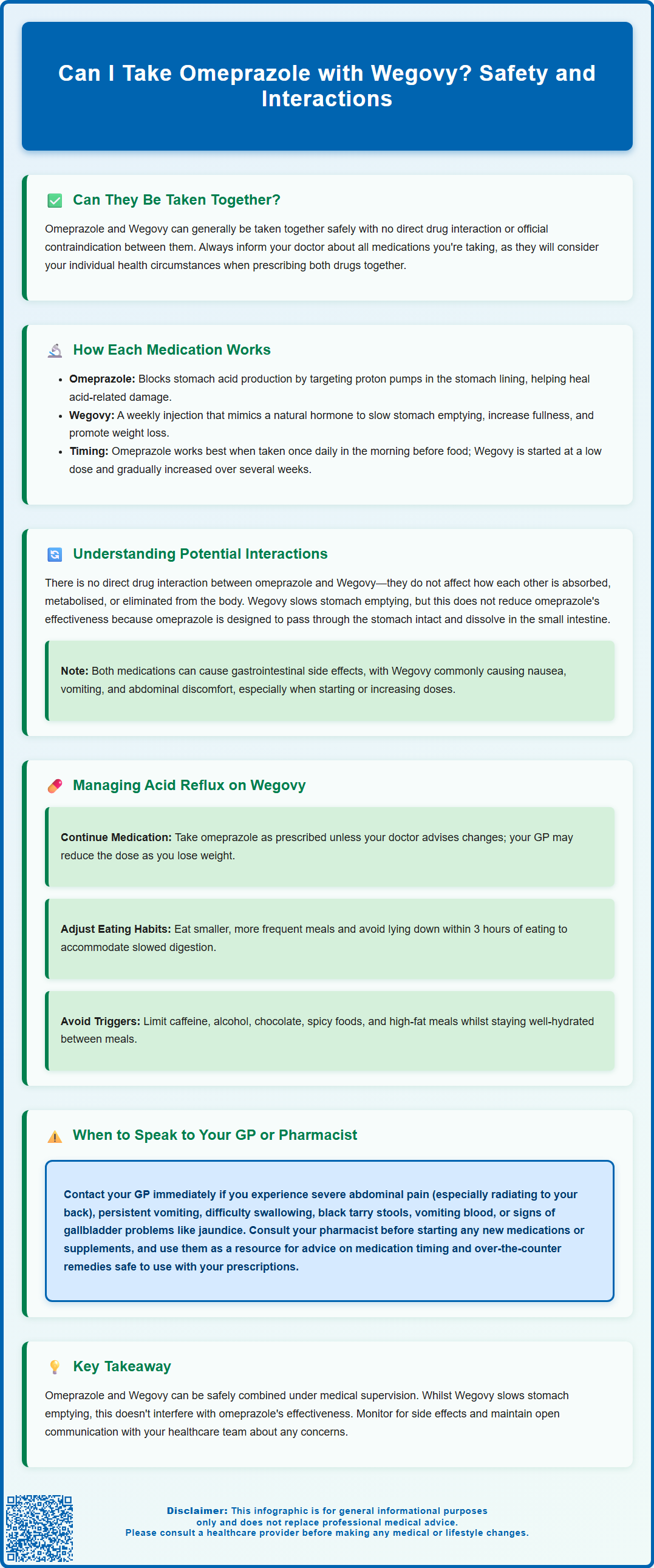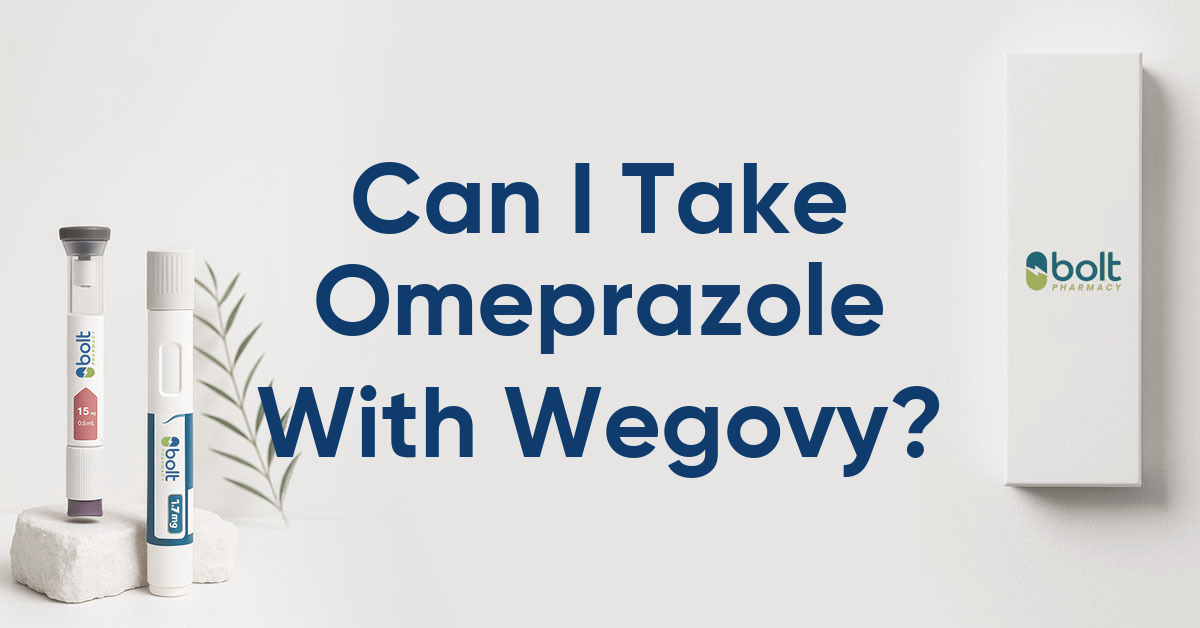Many patients prescribed Wegovy for weight management also take omeprazole for acid reflux or gastro-oesophageal reflux disease (GORD). If you're wondering whether it's safe to take omeprazole with Wegovy, the answer is generally yes—there is no direct contraindication or pharmacological interaction between these medicines. Omeprazole, a proton pump inhibitor (PPI), reduces stomach acid production, whilst Wegovy (semaglutide), a GLP-1 receptor agonist, works by slowing gastric emptying and reducing appetite. Although both affect your digestive system in different ways, they can typically be used together safely. Always inform your GP or prescribing clinician about all medications you're taking to ensure personalised, safe treatment.
Summary: Yes, you can generally take omeprazole with Wegovy, as there is no direct contraindication or pharmacological interaction between these medicines.
- Omeprazole is a proton pump inhibitor that reduces stomach acid production, whilst Wegovy (semaglutide) is a GLP-1 receptor agonist that slows gastric emptying and reduces appetite for weight management.
- No direct pharmacokinetic or pharmacodynamic interaction exists between omeprazole and Wegovy according to MHRA and EMA guidance.
- Wegovy slows gastric emptying, but this does not compromise omeprazole's effectiveness as it is designed to dissolve in the small intestine.
- Both medicines can cause gastrointestinal side effects; monitor for worsening reflux, persistent nausea, or severe abdominal pain and contact your GP if symptoms develop.
- Always inform your healthcare professional about all medications you're taking, and seek pharmacist advice before self-medicating with over-the-counter omeprazole whilst on Wegovy.
Table of Contents
Can I Take Omeprazole with Wegovy?
Yes, you can generally take omeprazole alongside Wegovy (semaglutide). There is no official contraindication or direct pharmacological interaction between these two medicines, and many patients safely use them together. Omeprazole is a proton pump inhibitor (PPI) commonly prescribed for acid reflux, gastro-oesophageal reflux disease (GORD), and stomach ulcers, whilst Wegovy is a GLP-1 receptor agonist licensed for weight management in adults with obesity or overweight with weight-related health conditions.
However, it is essential to inform your GP or prescribing clinician about all medications you are taking, including over-the-counter medicines and supplements. Whilst omeprazole and Wegovy do not interact directly at a pharmacological level, both can affect your gastrointestinal system in different ways. Wegovy slows gastric emptying as part of its mechanism to promote satiety and weight loss, which may influence how your body experiences acid-related symptoms or how other medications are absorbed. According to the Wegovy SmPC, clinically relevant interactions with most oral medicines are not expected despite this effect.
Always follow your healthcare professional's advice regarding timing and dosing of your medications. If you have been prescribed both medicines, your doctor will have considered your individual circumstances, including any pre-existing gastrointestinal conditions. While omeprazole is available over the counter for short-term use, seek pharmacist advice before self-medicating whilst on Wegovy, particularly if you are experiencing new or worsening digestive symptoms that may require medical assessment.

How Omeprazole and Wegovy Work in Your Body
Omeprazole belongs to a class of medicines called proton pump inhibitors (PPIs). It works by blocking the proton pumps in the stomach lining that produce gastric acid. By significantly reducing acid production, omeprazole helps heal and prevent damage to the oesophagus, stomach, and duodenum caused by excess acid. The medicine is typically taken once daily, usually in the morning before food, and reaches peak effect after several days of consistent use. Omeprazole is absorbed in the small intestine and metabolised primarily in the liver through the cytochrome P450 enzyme system, particularly CYP2C19 and CYP3A4.
Wegovy (semaglutide) is a glucagon-like peptide-1 (GLP-1) receptor agonist administered as a once-weekly subcutaneous injection. It mimics the action of natural GLP-1, a hormone released after eating that regulates appetite and blood glucose. Semaglutide works through several mechanisms: it slows gastric emptying (the rate at which food leaves your stomach), increases feelings of fullness, reduces appetite signals in the brain, and improves insulin secretion whilst suppressing glucagon release. These combined effects lead to reduced calorie intake and significant weight loss over time. Wegovy is started at a lower dose (0.25mg) and gradually increased over several weeks to the maintenance dose of 2.4mg to minimise gastrointestinal side effects.
The key difference in their mechanisms is that omeprazole specifically targets acid production, whilst Wegovy affects gut motility and appetite regulation. Neither medicine significantly affects the other's metabolism or elimination from the body. However, because Wegovy slows how quickly food and medications move through your digestive system, this may theoretically influence the absorption of some oral medications. If you take warfarin, your doctor may recommend more frequent INR monitoring when starting Wegovy, as advised in the product information.
Potential Interactions Between Omeprazole and Wegovy
There is no direct pharmacokinetic or pharmacodynamic interaction between omeprazole and Wegovy documented in clinical literature or recognised by the MHRA or EMA. This means that taking these medicines together does not alter how either drug is absorbed, distributed, metabolised, or eliminated from your body in a clinically meaningful way. Studies of semaglutide have not identified PPIs as problematic co-medications, and omeprazole's metabolism is not affected by GLP-1 receptor agonists.
However, indirect considerations are important. Wegovy's effect on gastric emptying means your stomach takes longer to process food and oral medications. For most medicines, including omeprazole, this delay does not reduce effectiveness. Omeprazole is acid-resistant and designed to pass through the stomach intact before dissolving in the small intestine, so delayed gastric emptying should not compromise its therapeutic action. The Wegovy SmPC notes that while gastric emptying is delayed, clinically relevant interactions with most oral medicines are not expected. However, for medicines with a narrow therapeutic index (where small changes in blood levels can affect safety or efficacy), more careful monitoring may be needed.
Gastrointestinal side effects are worth monitoring when using both medicines. Wegovy commonly causes nausea, vomiting, diarrhoea, constipation, and abdominal discomfort, especially when starting treatment or increasing doses. Omeprazole is generally well-tolerated but can occasionally cause headaches, gastrointestinal disturbances, or, with long-term use, concerns about nutrient absorption (vitamin B12, magnesium, calcium). If you notice worsening reflux symptoms, persistent nausea, or severe abdominal pain whilst taking both medications, contact your healthcare professional promptly, as these symptoms may require assessment to rule out complications such as severe delayed gastric emptying or pancreatitis, which is a rare but recognised risk with GLP-1 agonists.
Managing Acid Reflux While Taking Wegovy
Many people starting Wegovy notice changes in their digestive symptoms, including heartburn or acid reflux. This can occur for several reasons: the slowed gastric emptying may allow stomach contents to remain longer, potentially increasing reflux episodes; reflux symptoms can fluctuate during weight loss and dietary change; and dietary modifications accompanying weight management may introduce trigger foods. Conversely, some patients find that significant weight loss ultimately improves their reflux symptoms, as obesity is a major risk factor for GORD.
If you are already taking omeprazole for established reflux disease, continue as prescribed unless your doctor advises otherwise. Your GP may review your PPI therapy periodically, as NICE guidance recommends using the lowest effective dose for the shortest duration necessary. Some patients find their reflux improves with weight loss and may eventually reduce or stop PPI treatment under medical supervision. Never stop omeprazole abruptly without consulting your doctor, as this can cause rebound acid hypersecretion.
Lifestyle and dietary modifications are crucial for managing reflux alongside Wegovy:
-
Eat smaller, more frequent meals rather than large portions, which can overwhelm your already-slowed digestive system
-
Avoid lying down within 3 hours of eating to reduce reflux risk
-
Identify and limit trigger foods such as caffeine, alcohol, chocolate, spicy foods, and high-fat meals
-
Stay well-hydrated but avoid drinking large volumes with meals
-
Elevate the head of your bed by 15-20cm if you experience night-time symptoms
-
Maintain good posture during and after meals
If reflux symptoms worsen or new symptoms develop whilst taking Wegovy, contact your GP. Persistent vomiting, difficulty swallowing, unintentional weight loss beyond expected, or severe abdominal pain require prompt medical assessment. Your doctor may need to adjust your Wegovy dose, review your PPI therapy, or investigate other causes of your symptoms.
When to Speak to Your GP or Pharmacist
Contact your GP or prescribing clinician if you experience:
-
Severe or persistent nausea and vomiting that prevents you from taking your regular medications or staying hydrated
-
New or worsening reflux symptoms despite taking omeprazole as prescribed
-
Severe abdominal pain, particularly if constant or radiating to your back, which could indicate pancreatitis (a rare but serious side effect of GLP-1 agonists)
-
Pain in the upper right abdomen, fever, jaundice, pale stools or dark urine, which could indicate gallbladder problems (more common with GLP-1 agonists)
-
Difficulty swallowing or a sensation of food sticking in your chest or throat
-
Unexplained weight loss beyond what is expected with Wegovy, or inability to maintain adequate nutrition
-
Signs of gastrointestinal bleeding, including black tarry stools, vomiting blood, or severe anaemia symptoms (extreme fatigue, breathlessness, pale skin)
-
Symptoms of low magnesium if you have been on omeprazole long-term, such as muscle cramps, tremors, irregular heartbeat, or seizures
Seek urgent help via NHS 111 or call 999 for severe abdominal pain, significant vomiting of blood, large amounts of black tarry stools, or if you feel faint or extremely unwell.
Your pharmacist can help with:
-
Advice on timing your medications to optimise absorption and minimise side effects
-
Over-the-counter remedies for mild digestive discomfort, ensuring they are safe to use with your prescribed medicines
-
Recognising side effects and determining whether they require medical attention
-
Medication reviews to check for any potential issues with your complete medication regimen
Before starting any new medication, including over-the-counter products or supplements, whilst taking Wegovy and omeprazole, consult your pharmacist or GP. Some medicines, particularly those affecting gastric pH or gut motility, may require special consideration. If you take warfarin, more frequent INR monitoring may be needed when starting Wegovy.
If you suspect you're experiencing side effects from either medication, you can report them through the MHRA Yellow Card scheme. Your healthcare team can provide personalised advice based on your complete medical history, ensuring safe and effective management of your weight loss journey alongside any other health conditions requiring treatment.
Frequently Asked Questions
Does Wegovy affect how omeprazole works?
No, Wegovy does not affect omeprazole's effectiveness. Although Wegovy slows gastric emptying, omeprazole is designed to pass through the stomach intact and dissolve in the small intestine, so its therapeutic action remains uncompromised.
Can taking omeprazole and Wegovy together cause side effects?
Both medicines can cause gastrointestinal side effects independently. Wegovy commonly causes nausea, vomiting, and abdominal discomfort, whilst omeprazole is generally well-tolerated but may cause headaches or digestive disturbances with long-term use. Contact your GP if you experience worsening symptoms.
Should I tell my doctor I'm taking both omeprazole and Wegovy?
Yes, always inform your GP or prescribing clinician about all medications you're taking, including over-the-counter medicines. Your doctor will consider your individual circumstances and any pre-existing gastrointestinal conditions to ensure safe, effective treatment.
The health-related content published on this site is based on credible scientific sources and is periodically reviewed to ensure accuracy and relevance. Although we aim to reflect the most current medical knowledge, the material is meant for general education and awareness only.
The information on this site is not a substitute for professional medical advice. For any health concerns, please speak with a qualified medical professional. By using this information, you acknowledge responsibility for any decisions made and understand we are not liable for any consequences that may result.
Heading 1
Heading 2
Heading 3
Heading 4
Heading 5
Heading 6
Lorem ipsum dolor sit amet, consectetur adipiscing elit, sed do eiusmod tempor incididunt ut labore et dolore magna aliqua. Ut enim ad minim veniam, quis nostrud exercitation ullamco laboris nisi ut aliquip ex ea commodo consequat. Duis aute irure dolor in reprehenderit in voluptate velit esse cillum dolore eu fugiat nulla pariatur.
Block quote
Ordered list
- Item 1
- Item 2
- Item 3
Unordered list
- Item A
- Item B
- Item C
Bold text
Emphasis
Superscript
Subscript










